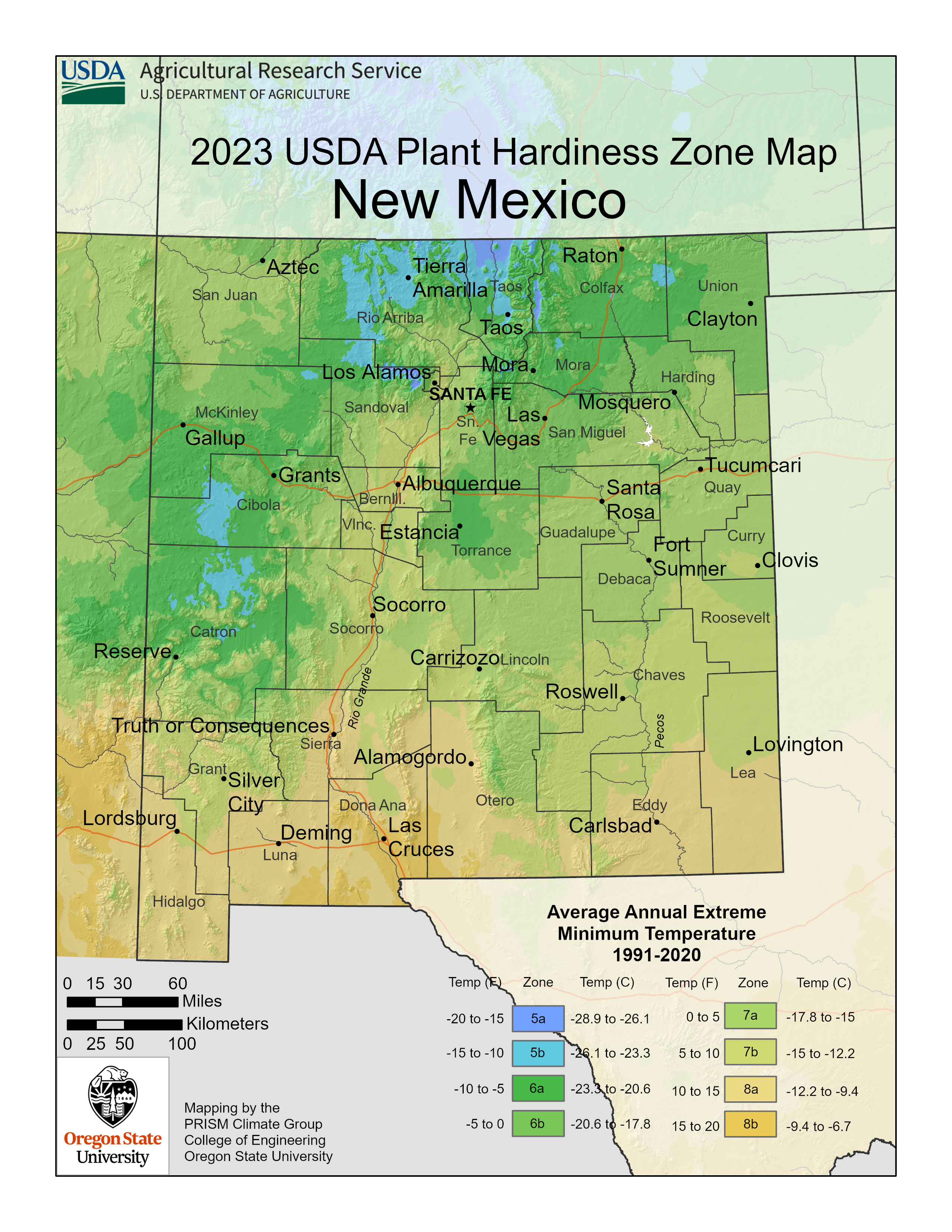It’s okay not to want bees in your garden. However, it’s essential to remove them the right way. To help, here are the seven best ways to naturally get rid of bees from your garden.
The seven best ways to naturally get rid of bees from your garden are:
- Plant bee-repellent flowers
- Water your lawn regularly
- Fill holes on your property
- Smoke them away
- Use garlic spray
- Sprinkle cinnamon around nest holes
- And hire a beekeeper to remove nests
7 Best Ways To Naturally Get Rid Of Bees From Your Garden
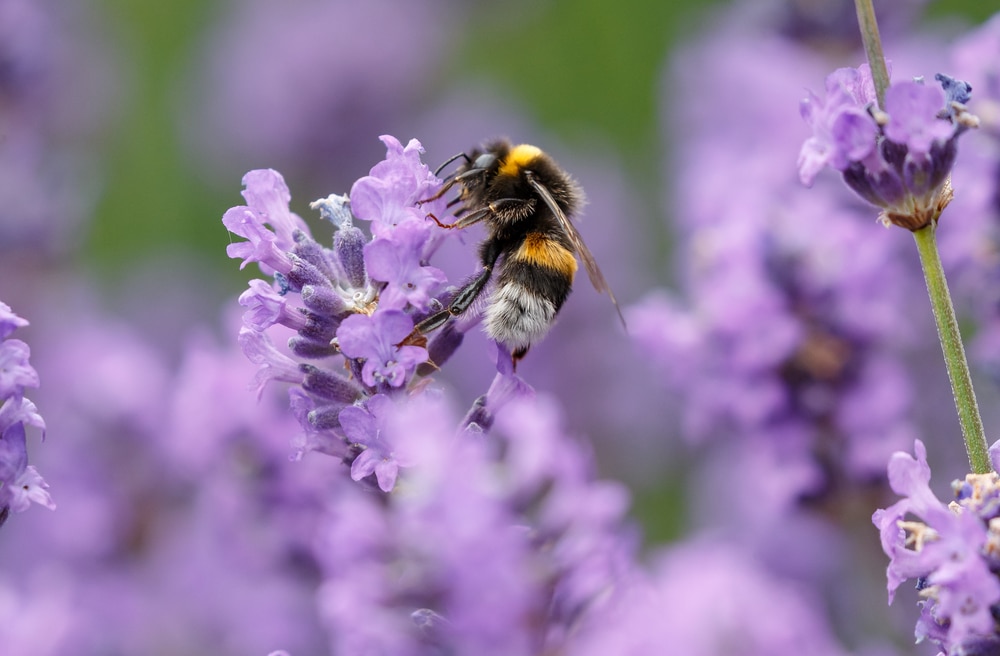
When you consider how many effective natural ways to control the bee populations in your garden there are, you’ll realize pesticides are not the way forward.
Let’s start with planting bee-repelling flowers.
1 – Plant Bee-Repelling Flowers
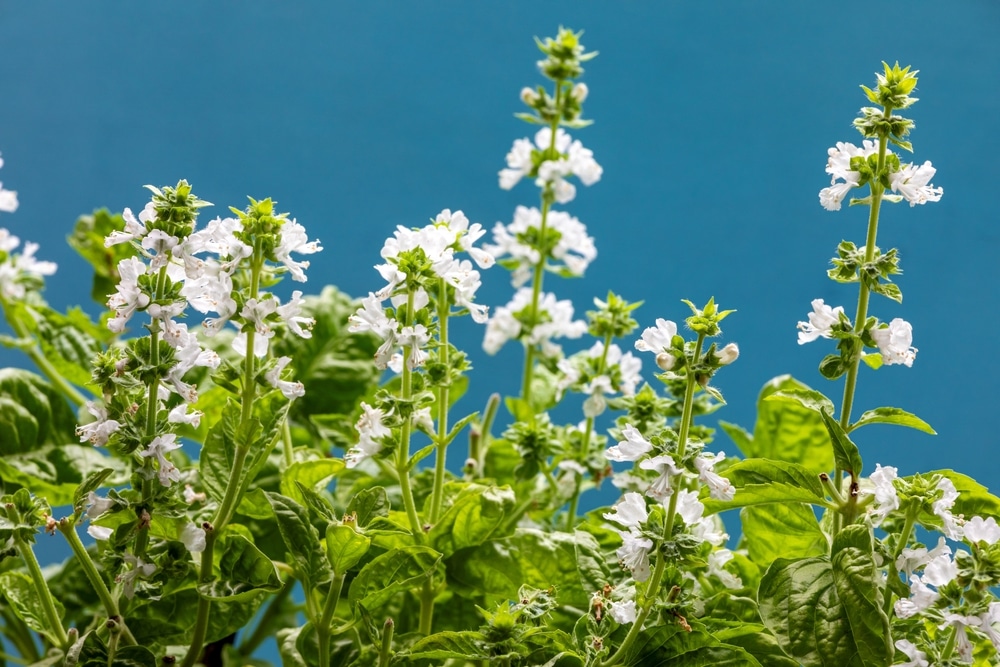
Many flower species attract bees, but there are also tons of plants bees can’t stand. You’ll notice far fewer bee visitors by planting them in your garden.
One of the most highly acclaimed bee-repelling plants is mint. It can be spearmint or peppermint; both work equally as well. These are great for growing in pots and are relatively easy to care for. Plus, since you can use mint in cooking, it’s also a fantastic way to start a kitchen garden.
Citronella is another very common option in gardens where bees are not welcome. This strong-smelling plant is everything bees don’t like, but it actually smells lovely to humans.
Place citronella plants around your seating areas, which will act as a barrier to bees. However, burning citronella candles can be just as effective if you can’t get hold of the plants.
With all that said, I have some bad news; there aren’t many plants that will repel bees. In most cases, bees are attracted to flowering plants, but you can include some of the following species to keep them away:
- Wormwood
- Eucalyptus
- Basil
- Geranium
- Pennyroyal
- Cucumber
2 – Regularly Water Your Lawn To Prevent Ground Nesting Bees
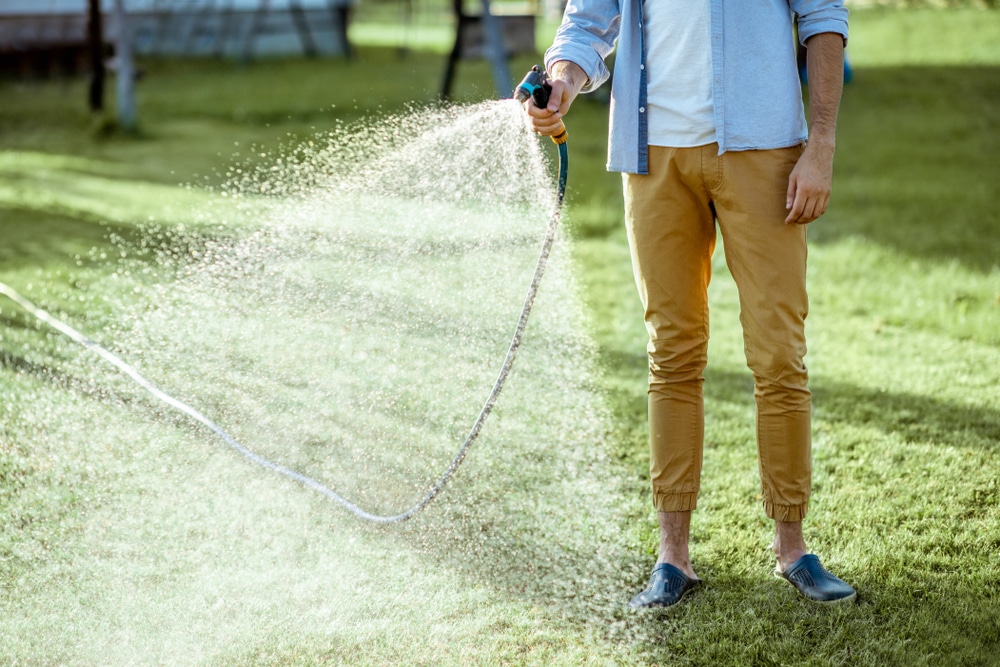
When most people think about bees, they imagine insects living in hives or elevated nests. While this is the case for many bee species, there are several examples of ground-nesting bees, the bumble bee among them.
If you’re having issues with bees nesting in the ground, the best way to deter them is to make the ground unfit.
When nesting in soil, bees require it to be as dry as possible. So, regularly watering your lawn will prevent them from tunneling into the soil. What’s more, a well-hydrated lawn is a healthy lawn, which will grow more densely. Since ground bees require some patches of bare soil, this is an excellent way to keep them out.
3 – Fill Any Holes On Your Property
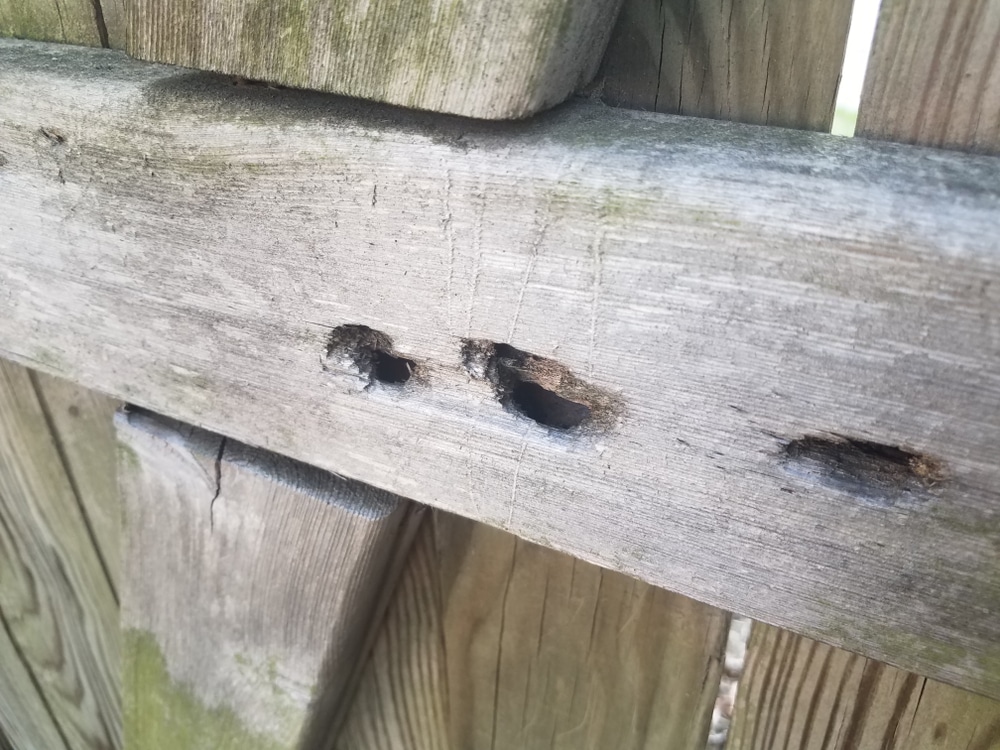
Many bees are cavity nesters, meaning they’ll set up shop in any hole they can fit into. This includes holes on your property.
Carpenter bees are well known for boring holes into wooden structures (hence their name), but they will also use existing holes. So, filling in any holes on your property, even small ones, is vital. Bees can even fit through holes as small as five millimeters!
You can use something like caulk to fill in the gaps, but I highly recommend closely assessing your property so you don’t miss anything.
4 – Smoke The Bees Away

Have you ever watched a beekeeper using smoke when looking after their hive? There’s a good reason for this: smoke calms bees.
On top of this, bees associate the smell of smoke with fire, which could destroy their habitat. Just like you or I, they’ll flee when they smell it.
So, light a fire in your garden (safely) and let the smoke work its magic. It is important to check local laws on what you can and can’t burn, but this can be a great way to eliminate unwanted cardboard, for example.
If you have a bee nest, it is possible to light the fire directly underneath to smoke the bees out.
However, if you decide to approach this method, err on the side of caution. Even contained fire can be dangerous, so ensure you have an extinguisher nearby and never leave a fire unattended.
5 – Use Garlic Spray
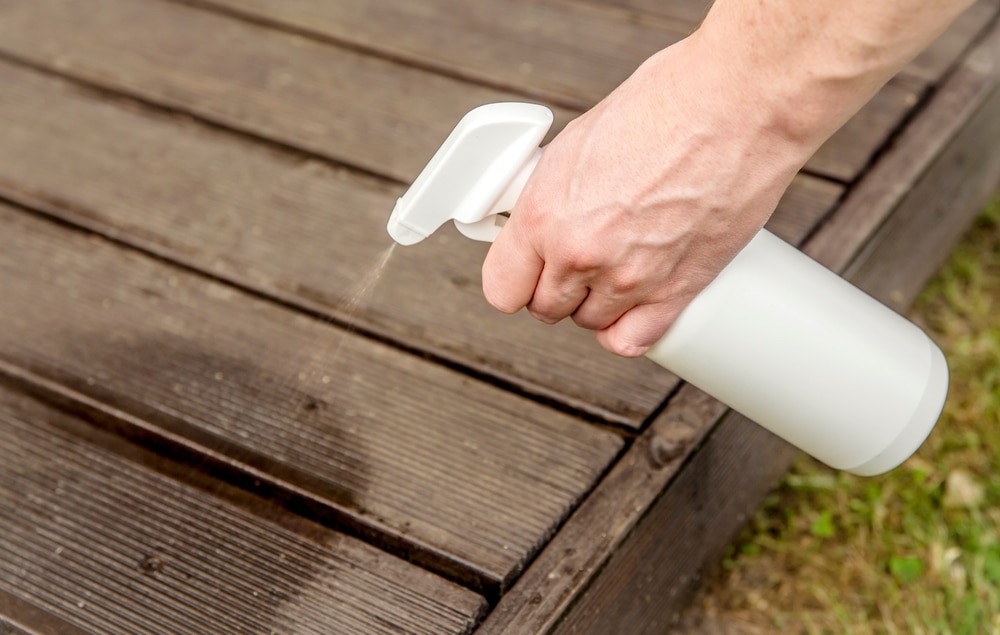
Just like bees hate the smell of certain flowers, they also cannot stand the smell of garlic. You can easily get rid of unwanted bees by boiling some garlic cloves in water and then adding the resulting mixture to a spray bottle.
Where there is a nest, you can apply the spray directly, or if you’re simply looking to keep bees away in general, just douse your patio furniture, fences, and other garden structures with the spray.
Of course, this will mean that your furniture has a bit of a garlicky whiff for a while. If this bothers you, use a cleaning solution to remove the smell. However, I advise waiting at least a few days to ensure the bees are gone for good.
6 – Sprinkle Cinnamon Around Nest Holes

Another scent bees cannot stand is cinnamon. It’s effective when you sprinkle it around holes in the ground where bees nest.
This method doesn’t always yield the fastest results, as it may take some time for the bees to notice it. But once they do, they’ll quickly move on to another spot and leave you in peace.
7 – Hire A Beekeeper To Remove The Nest
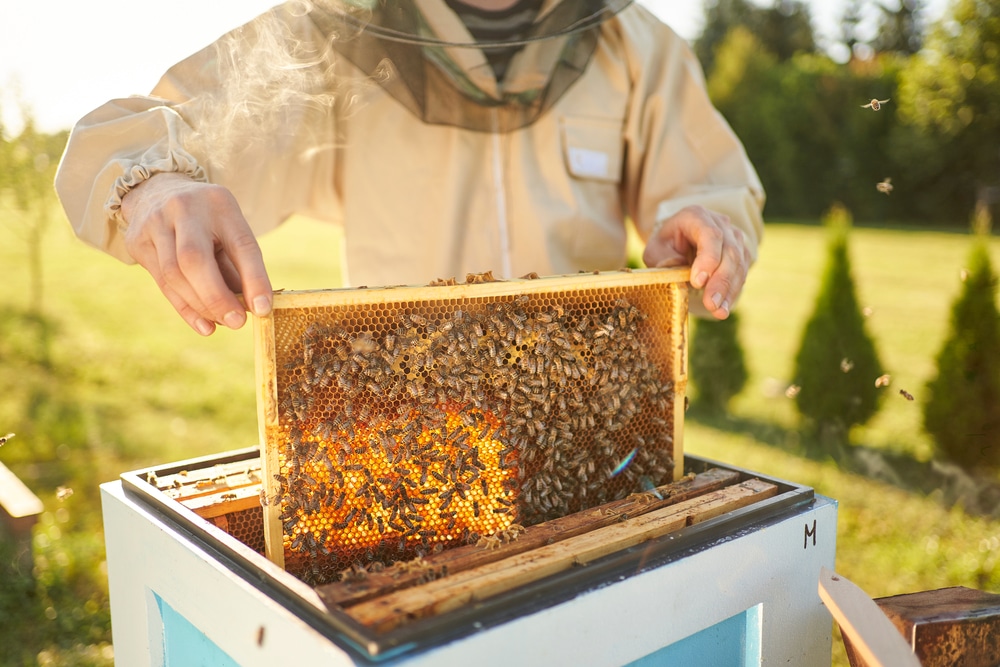
Unfortunately, I hear of a lot of cases where bees are stubborn. No matter what homeowners do, they simply cannot rid their gardens of unwanted visitors.
Thankfully, many pest control services out there can handle the situation. However, many use chemicals harmful to bees.
Speaking to a local beekeeper is a great place to start if you’re looking for a more organic method. In many cases, beekeepers will be happy to come and remove a nest and place it somewhere more suitable. What’s more, there are even beekeepers who will take on a colony themselves.
Last Resort – Use A Homemade Vinegar Spray (This Can Kill Bees)
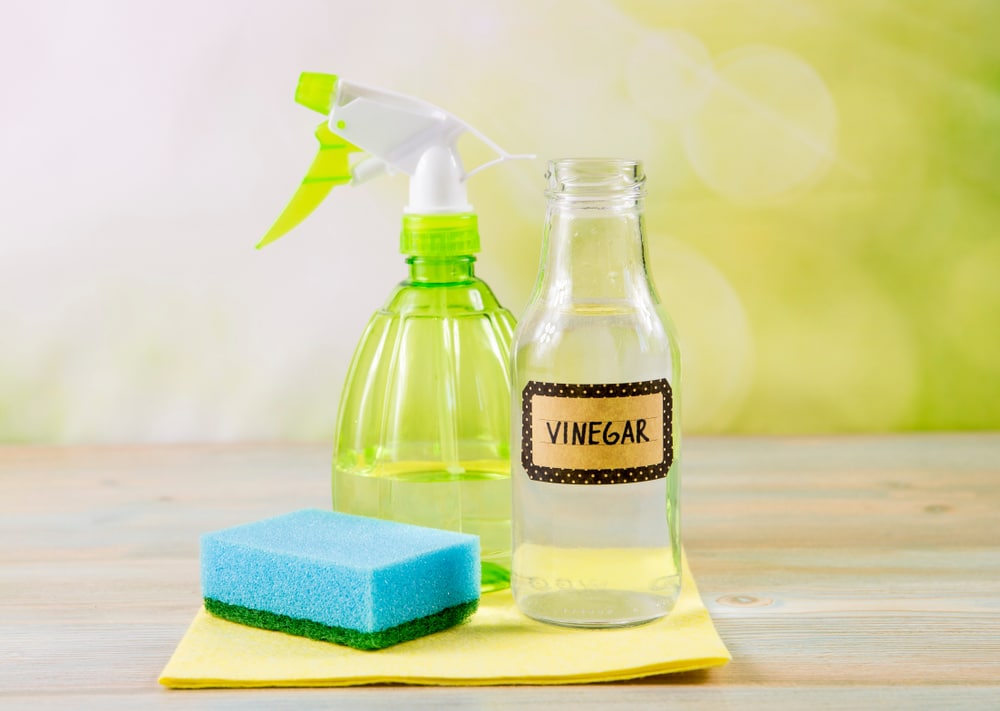
All of the methods I have discussed so far in this list are harmless to bees. They may not like them, but nothing here will kill them. Vinegar is a different story.
When exposed to vinegar, bees meet a quick demise, so I would use it as a last resort, considering they are beneficial insects.
You can create a natural pest controller by using a similar method to the garlic spray and mixing vinegar with water. You can even spray the solution (one part water to one part vinegar) onto your garden plants. This won’t kill bees if they don’t land on the flowers, but the smell will be enough to make them look elsewhere for food.
Why Not Just Use Pesticides To Get Rid Of Bees?
Many chemical products are out there to get rid of unwanted insects (pesticides). While highly effective, they pose worse risks to bees than just killing them.
In fact, bees can encounter certain pesticides and not die. However, exposure can result in problems with the bee’s immune and reproductive systems and more.
Since bees are essential to a healthy ecosystem and pollinate a large percentage of human crops, we don’t want to harm them.
It’s fine not to want to welcome them to your garden, but it’s much better to deter them using the organic methods I’ll talk about in this guide.
Safety Tips When Working Around Bees
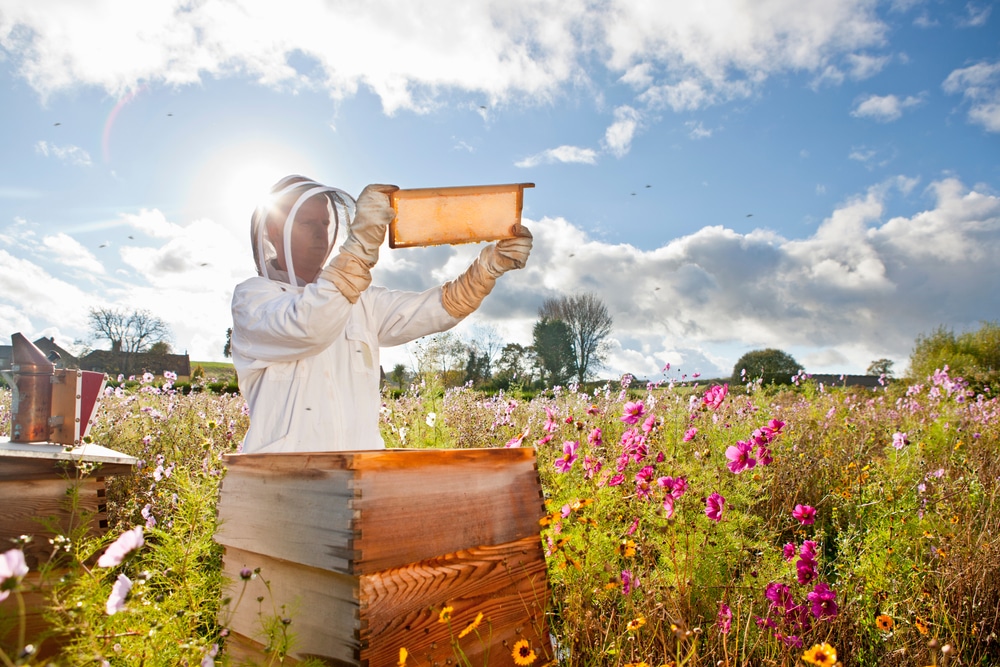
Bees are not usually aggressive but can become so when they feel threatened. If you’re using any of the methods I have discussed in this guide, there is a good chance you’ll upset the bees. This means taking some essential precautions.
Wear Protective Clothing
While a bee suit is usually the best option, we don’t all have one lying around. Instead, you can use long-sleeved tops, long pants, gloves, and a face covering.
Walk Away And Try Again Later
If the bees are showing any signs of serious aggression or look as though they’re gathering in large numbers, walk away and try again another time. Honey bees give off an alarm pheromone when in danger, which signals a threat to other bees. Once they get wind of this, they’ll quickly come to the rescue, and you’ll soon find yourself outnumbered.
Try When Bees Aren’t Active
Try to time your efforts with the bees’ natural rhythm. Most bees become active as things warm up in the morning and return to the nest before sunset. Applying your chosen method before or after these times will limit your exposure to the bees themselves.
Move Slowly
When you are around bees, don’t make any sudden movements. They will view this as a threat. Take slow, considered movements, and remain as calm as possible. While bees can’t smell fear, they can pick up on pheromones animals (including humans) release when they are afraid.
Call A Professional
Don’t attempt the work yourself if you are ever in any doubt. Call a professional who will handle the situation safely.
Are Bees Harmful To Me And My Garden?
Not at all! Bees are beneficial insects, as they pollinate a wealth of plants and crops. Having bees in your garden is great if you want to encourage the healthy growth of your plants and a good fruit and vegetable yield.
What’s more, while many people are fearful of bees, it’s essential to keep in mind they’re not dangerous creatures. Yes, they can sting, but they don’t do this unless they feel threatened.
For the most part, having bees in your garden won’t come with many problems. Things start to get annoying when they come in large amounts.
Reasons To Get Rid Of Bees From Your Garden
If bees are a vital player in a healthy garden and don’t pose too much of a risk to humans, then you’re probably wondering whether you need to get rid of them at all.
They Can Be A Nuisance (And Worse)
A single bee or a small handful buzzing around and pollinating your plants is good. But if you end up with a nest, you may find yourself swatting at them.
Swatting is not something you should ever do when a bee approaches. Bees (and their bee friends) may rear up and become aggressive. Not having any bees around (or reducing their numbers to manageable amounts) solves this issue. This is especially important for those with bee allergies, as bee stings can be fatal.
To Protect (And Enjoy) Your Food And Drink
Moreover, food and drinks often attract bees, especially sweet items. If you’re into al fresco dining (dining outside), you’ll know how irritating it can be to have a flow of winged visitors interested in your plate.
You can cover the food to try to prevent bees, but that’s challenging when you’re trying to eat.
To Protect Your Pets
Pets are another reason you may want to get rid of bees from your garden. Animals like dogs and cats can be very curious, but they can also have bee sting allergies. Moreover, the pain of being stung by a bee is traumatic enough for your pet, even if they don’t have an adverse reaction.

